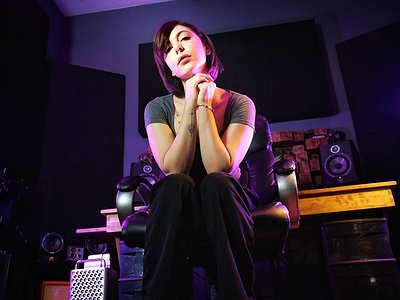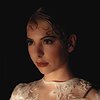Part 1
Name: Kanga
Nationality: American
Occupation: Producer, songwriter, vocalist
Current release: Kanga's new album, You and I Will Never Die is out now on Artoffact.
Recommendations: I love the painter Remedios Varo. Everyone who likes Dali or Picasso should check her out. She's the best kept secret in twentieth century surrealism.
The book "House of Leaves" by Mark Z Danielewski is one of my favorite pieces of literature. It's a psychological thriller but it weaves you through worlds that are completely destabilizing for the reader. I recommend it to everyone.
If you enjoyed this interview with Kanga, visit her on Facebook, Twitter or Instagram for even more information, updates and music.
When did you start writing/producing music - and what or who were your early passions and influences? What was it about music and/or sound that drew you to it?
My earliest memories were writing lyrics in my diary and trying to play radio songs on the piano. I've always had a strong ear but growing up I couldn't commit myself to any one instrument. Maybe it was childhood restlessness but I cycled through cello, flute, piano, and guitar without ever being able to settle for one.
It wasn't until I was 16 that I enrolled in music production classes. That was the key to honing in my musical interests. I think I like being able to work with songs like a sculptor, where I can see the track in its entirety and work with it in a way that I feel is closer to sculpting or painting. With production you get to play with space as well as time. I like being able to work nonlinearly. This also stuck because at the same time I was getting into more experimental music. I've talked a lot about Skinny Puppy and how they were a huge inspiration for me, but I think it's worth mentioning that a lot of the new and illuminating music I was listening to at this time I discovered on torrenting and music sharing platforms like Limewire. People would just throw up random tracks, often unnamed, and you'd decide whether the risk of downloading a virus would be worth potentially finding your next favorite track. That's actually how I discovered Rhys Fulber. His remix of "Worlock" was shared as an unnamed track when I was searching for the fabled Tapeworm Project.
For most artists, originality is preceded by a phase of learning and, often, emulating others. What was this like for you: How would you describe your own development as an artist and the transition towards your own voice?
In short, mildly embarrassing but with eventual payoff. To put it lightly I really emulated some artists in the beginning. For me it was more about figuring out a formula that worked on me and attempting to pay homage to it. But it really boxed me into a sound that, although resonated with a lot of people, did deny me some autonomy. I don't regret it though because I ultimately learned what works and what doesn't for me.
Since then I've put a lot of emphasis on developing my own style so as to be able to stand on my own two feet as an artist. However, if any younger artists in the future decide to emulate my work, I would endorse that wholeheartedly. I can't think of a more flattering thing to be blessed with.
How do you feel your sense of identity influences your creativity?
I don't know if I really have a solid sense of identity to be honest. That's something that's been a blessing and a curse for me. It was difficult for me to find groups to fit into because my interests were never based on expressing ideologies. Which is not so fun for a teenager but it has prevented me from falling prey to groupthink mentalities.
But as an artist it was never appealing to write about my gender, sexual orientation, or political leanings. I definitely think there's a place for this type of music but I always found it more interesting to extrapolate on specific experiences and express them in more universal terms. I have always had this mentality that what I believe in is none of your business and what you think of me is none of mine. Maybe I'm stubborn, but I'd like to think that I'm someone who can write music that umbrellas the human condition rather than preaching specific ideologies.
What were your main creative challenges in the beginning and how have they changed over time?
From the beginning I didn't want to have to rely on anything in order to make music. I didn't want to be in a band, I didn't want to work with producers, I didn't want to deal with singers, and I just generally wanted to make very insular personal art. The downside of this is when you try to do it all you have a harder time developing real skills in one specific area. It takes twice as long and you get half as far but I wanted to be able to say I could do it all myself.
Now I don't really have that chip on my shoulder anymore and I've realized the importance of really honing in on your craft. I spent so much time learning how to produce that I felt like my song writing and musicianship really took a backseat. Now that I'm at a place where I feel comfortable in my technical abilities I've really switched over to the songwriting part of music. Having technical skills is a great tool to have and it's put me in a position to help other artists where they might need some guidance, but at the end of the day I am an artist and the music will always come first.
As creative goals and technical abilities change, so does the need for different tools of expression, be it instruments, software tools or recording equipment. Can you describe this path for you, starting from your first studio/first instrument? What motivated some of the choices you made in terms of instruments/tools/equipment over the years?
Well the basic premise for how I got into sound design was that I was too poor to afford any hardware or synthesizers. I was gifted some really great software that is used in the sound design community and I ended up using that for a lot of my sounds. That ultimately gave me a really good education on the science of how sound works.
Becoming familiar with wavetables and samplers gave me a good knowledge foundation to apply to the hardware I eventually ended up getting. But even though I have more variety now having too many options doesn't give you more freedom. I think maybe the difference lies in the process. For me using internal instruments is better for creating a specific sound I have in my head whereas synthesizers are brilliant for playing around with and seeing where you end up. I think the combination of the two yields the best results for me.
Have there been technologies or instruments which have profoundly changed or even questioned the way you make music?
Definitely the integration of hardware and software lends itself to making a more organic composition. There was a lot of copy-paste action in the early days just relying off the grid in Ableton. That always leads to really stiff sounding arrangements. I've never gotten over the Kurt Cobain quote that goes, "we're just a verse-chorus-verse band" which is self deprecating and funny but also relatable.
I wanted to be more sonically interesting so I really pushed myself to be more organic with the arrangements. It's hard because, like Nirvana, I am a "verse-chorus-verse" band but finding the balance between catchy predictability and intriguing experimenting is a challenging reward.
Collaborations can take on many forms. What role do they play in your approach and what are your preferred ways of engaging with other creatives through, for example, file sharing, jamming or just talking about ideas?
For me, a really cool collaboration is like a unicorn. Finding someone that can take an idea, add to it, and create a piece whose sum is greater than its parts is a dream of mine and I'm really looking forward to when that unicorn comes. But in the meantime I really enjoy remixing other artists. I like to finesse the tracks into duets a lot of the time. I think maybe that's my way of forcing the original artist to collaborate with me. Plus, I don't hear too many remixes where the remixer is interacting with the artist in the way that I do. It's fun to do and stylistically satisfying for me.
But as for inter-medium collaborations, I really enjoy working with visual artists on music videos, art, and there's even some tech players who've synced up with me on some upcoming projects. I love it when different worlds come together to create with each other.






